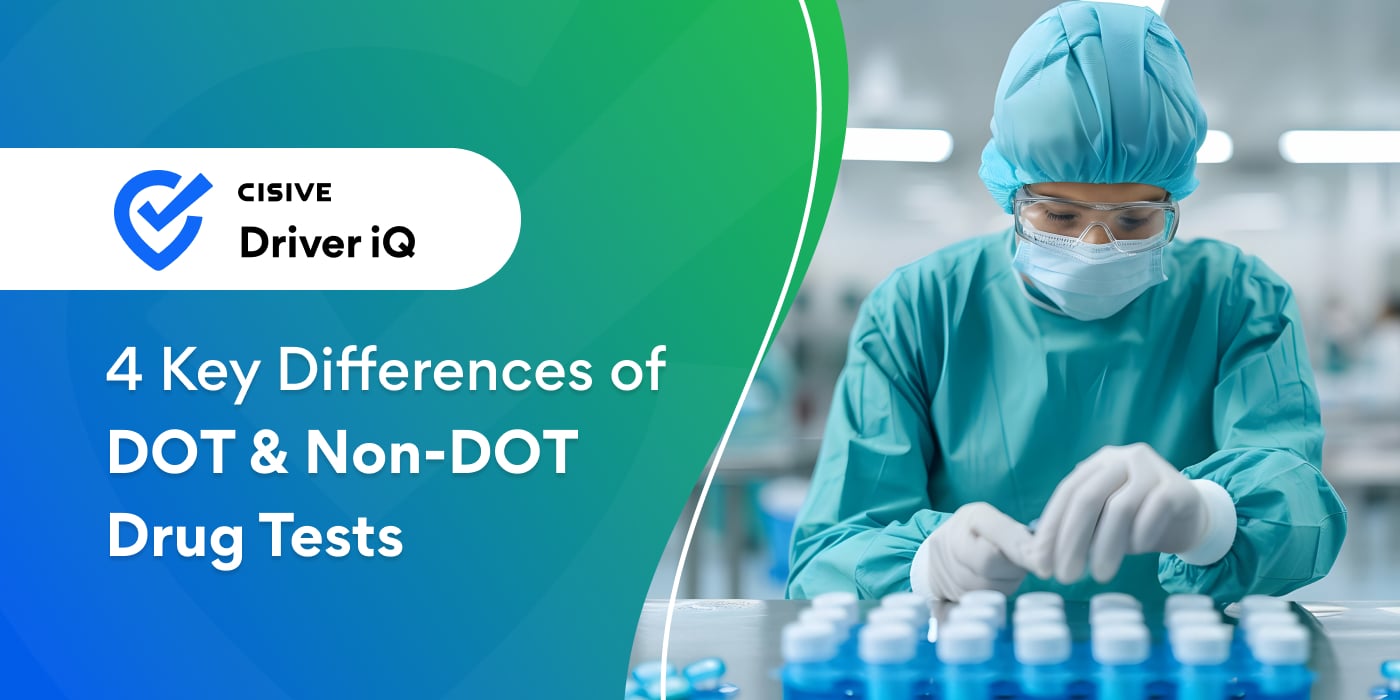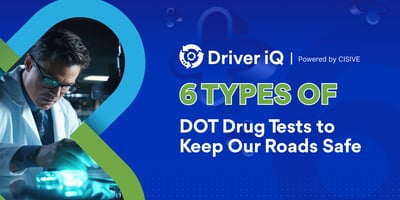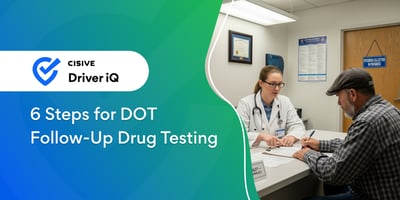
%20-%20Blog%20Post-1.png?height=200&name=BLOG_%20Understanding%20DOT%E2%80%99s%20Preemployment%20Drug%20Testing%20Requirements%20(Refreshed)%20-%20Blog%20Post-1.png)
The Department of Transportation (DOT) has hundreds of regulations designed to keep motorists,...

No matter how many employees you have, you're responsible for keeping them safe. Employers also have a duty to protect vendors, customers, and other stakeholders. Here's why it's so important to understand DOT vs. non-DOT drug test requirements:
As an employer, you're responsible for keeping employees, customers, and community members safe from harm. One way to satisfy this obligation is to implement a workplace drug testing program.
Some businesses have to comply with Department of Transportation test regulations, while others are free to create their own guidelines. Protect your business by learning more about DOT vs. non-DOT drug test requirements.
Key TakeawaysHere are the key things you should know about DOT vs. non-DOT drug tests:
|
A DOT drug test is a specific type of drug screen that complies with U.S. Department of Transportation regulations. If your company is subject to DOT regulations, you must administer a preemployment drug test before hiring CDL drivers to operate commercial motor vehicles.
You must also administer a DOT drug test in the following circumstances:
Finally, employers subject to DOT regulations must perform random drug testing. The required testing rate varies by DOT agency. For example, the Federal Motor Carrier Safety Administration (FMCSA) and the Federal Aviation Administration (FAA) are allowed to set different testing rates based on their needs.
Recommended Reading: Motor Carrier Guide to DOT-CDL Drug Testing
Testing rate refers to the number of random tests you must conduct in a calendar year. For example, if you manage a company with 200 employees and have a required drug testing rate of 50%, you'd have to perform at least 100 random drug tests per year to comply with the law.
A DOT drug test checks for the following drug classes:
Every DOT agency has a target drug testing rate of at least 25%, so this type of testing is extremely common.
Recommended Reading: Most Common DOT Clearinghouse Violations
A non-DOT drug test is a drug screen that doesn't comply with DOT requirements. If you aren't subject to DOT regulations, you have a lot more freedom when it comes to structuring your drug screening program.
Although non-DOT testing is more flexible than DOT testing, you still need to follow all relevant laws in your jurisdiction. Some states have no restrictions on workplace drug testing, while others prohibit employers from testing workers who aren't in safety-sensitive positions.
You also need to be aware of laws related to marijuana use in your state. In some states, it's illegal to discriminate against candidates or current employees simply because they use marijuana for medical or recreational purposes.
For example, Arizona forbids employers from taking adverse action against medical marijuana patients. The only exception is if an employee possessed, used, or was impaired by marijuana while working.
Your city may have even stricter laws than your state does, so make sure your HR team is aware of differences from one city to the next. In Philadelphia, employers aren't allowed to require preemployment cannabis testing unless one of the following exceptions applies:
Since non-DOT drug tests are more flexible, you can use them to test for a much wider range of substances. For example, it's possible to screen for barbiturates, methadone, and benzodiazepines in addition to the five drug classes included in a DOT test.
Non-DOT testing may produce the following benefits:

When you compare the DOT vs. non-DOT drug test requirements, a few key differences stand out. These differences relate to specimen collection, testing frequency, and substances included in each screen.
If you're bound by DOT regulations, your testing program must comply with all relevant collection guidelines. These guidelines exist to ensure the accuracy and validity of each test result.
Before an employee provides a specimen, the collector must verify their ID and make sure there's nothing in the test area that could be used to alter the results. For example, employees aren't allowed to have access to water, as they might use the water to dilute their urine.
DOT only requires observed collection in the following circumstances:
You have more flexibility when it comes to non-DOT tests. For example, you're not required to have someone observe the collection process for each return-to-duty test.
Additionally, DOT tests require split specimens. Once the test subject voids their bladder, the collector or another laboratory employee must split the specimen into two containers.
If the first half of the specimen produces a non-negative result, the lab runs another test on the second sample. You don't have to use split specimens when performing non-DOT drug tests.
Urine is the only acceptable specimen type for a DOT drug test. In contrast, labs may use urine, saliva, or hair to screen for drug use.
Recommended Reading: 6 Common Methods for Employee Drug Testing
Testing frequency is another major difference between DOT and non-DOT drug testing requirements. For example, DOT agencies require employers to perform random testing at a specific rate each year.
If you aren't subject to DOT regulations, you don't have to do any random testing at all. Therefore, you may decide to test only after an accident or when a manager suspects that an employee has been using drugs or alcohol on the job.
Reducing testing frequency may help you reduce the cost of maintaining a workplace drug testing program. Your employees may also be more receptive to testing.
As noted previously, a DOT drug test only checks for five types of drugs. If you aren't subject to the DOT regulations, you're free to test for additional substances.
For example, if you're concerned about safety issues related to benzodiazepines, you can test for drugs such as diazepam, alprazolam, and clonazepam.
DOT agencies require alcohol testing in addition to drug testing. You don't have to perform alcohol testing if you aren't subject to the DOT requirements.
The right choice for your company depends on several factors, such as what type of work your employees do and what type of business you operate. If you're subject to the testing regulations outlined in Title 40 of the Code of Federal Regulations, it's best to follow the DOT testing requirements and avoid penalties for noncompliance.
If you don't hire employees in safety-sensitive positions, or your company isn't involved in a DOT-regulated industry, you have a little more freedom. You can eliminate random testing, test at a lower rate than federal law requires, or test for additional substances.
Employee drug testing is often complex and confusing. Working with a professional drug testing service company, like Driver iQ, can clear up some of this uncertainty to ensure robust, compliant, and effective policies.
We can help determine if DOT or non-DOT drug testing is right for your company and develop a testing process that meets all governmental and company policies, values, and goals.
Even if you don't have to follow the DOT testing requirements, your company can benefit from having a strong workplace drug testing program. Preemployment tests, post-accident tests, and random tests may help you reduce your operating costs and maintain a positive reputation in the community.
Now that you understand DOT vs. non-DOT drug test requirements, it's time to apply what you learned. If you aren't already testing your employees, consider starting a formal drug screening program.
Driver iQ, a Cisive company, is a trusted partner in employment screening and verification. We know how important it is to conduct accurate background checks, especially for safety-sensitive positions, so we take care of everything from employment verifications to DOT drug testing.
Our solutions are tailored to the transportation industry, ensuring that you receive accurate results without delay. Speak with an expert to learn more about how Driver iQ can help you streamline your hiring processes and minimize risk.
Author: Jessica McDonald
Bio: Product Strategy and Development, Drug Testing and Occupational Health Subject Matter Expert at Cisive
Let's Connect on LinkedIn%20-%20Blog%20Post-1.png?height=200&name=BLOG_%20Understanding%20DOT%E2%80%99s%20Preemployment%20Drug%20Testing%20Requirements%20(Refreshed)%20-%20Blog%20Post-1.png)
The Department of Transportation (DOT) has hundreds of regulations designed to keep motorists,...

If you employ commercial drivers, your company is responsible for maintaining a formal drug testing...

When drivers fail a DOT-mandated drug or alcohol test or refuse to take one, they create...